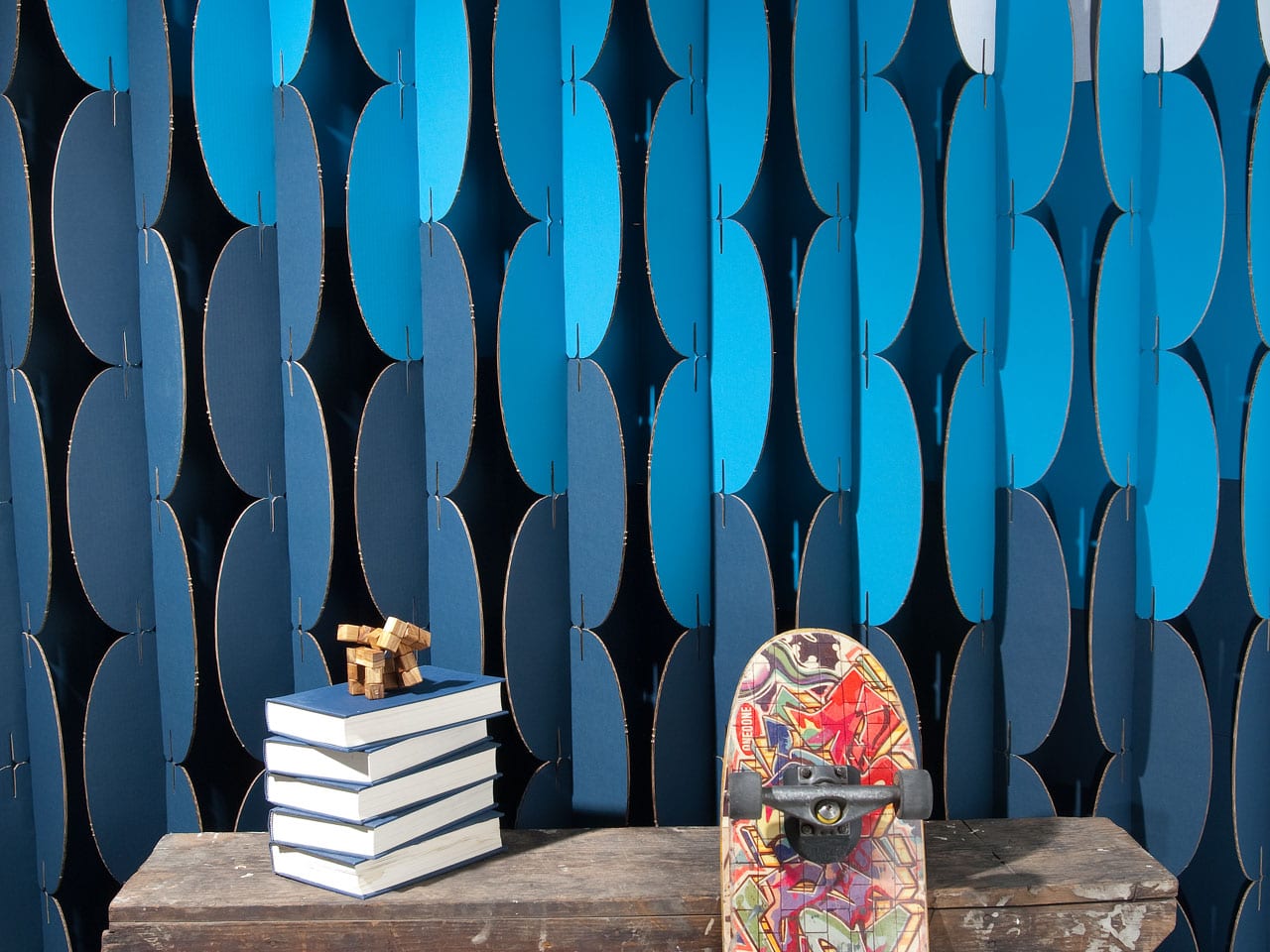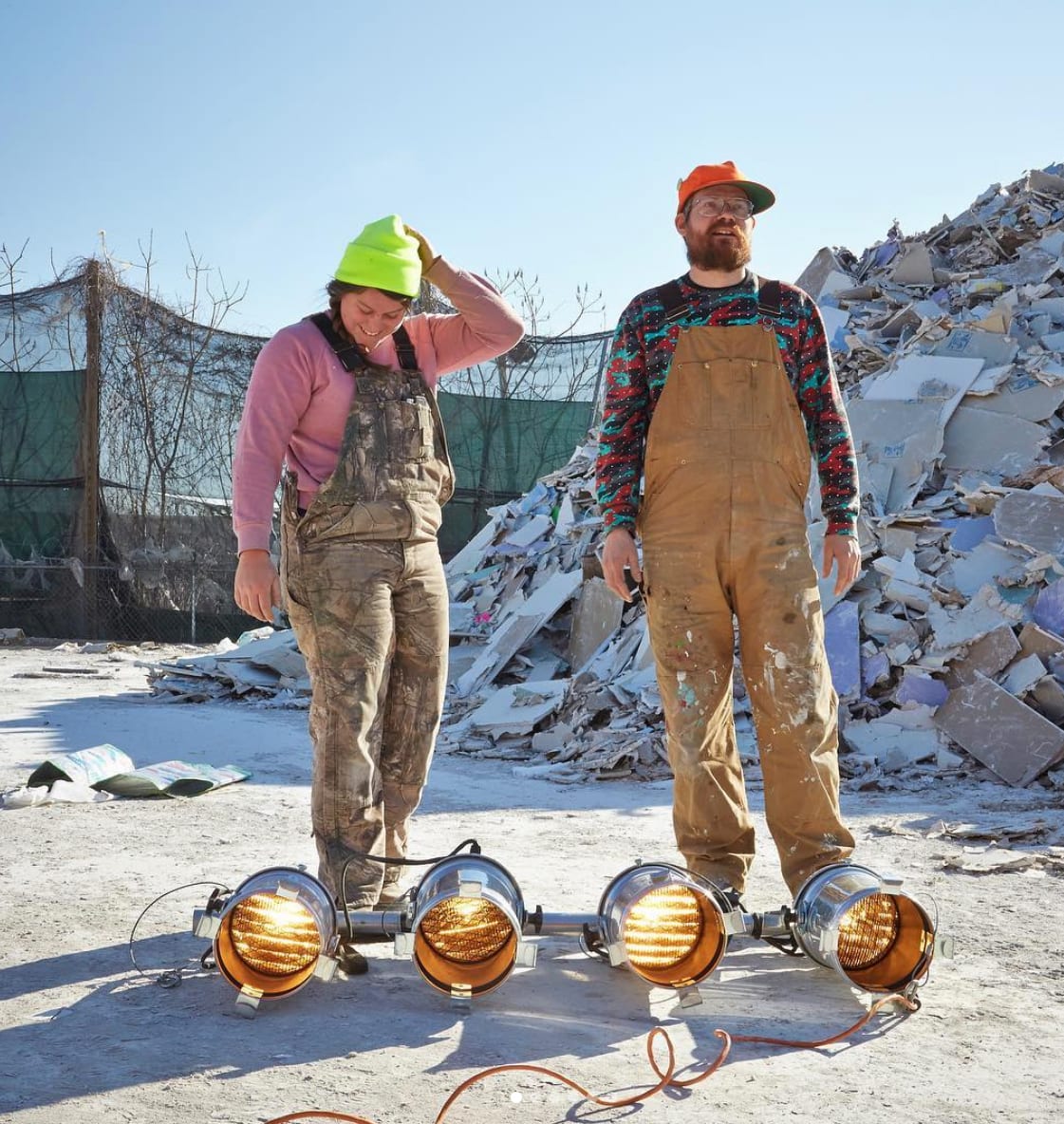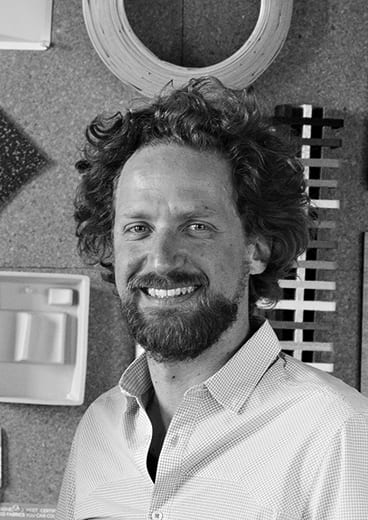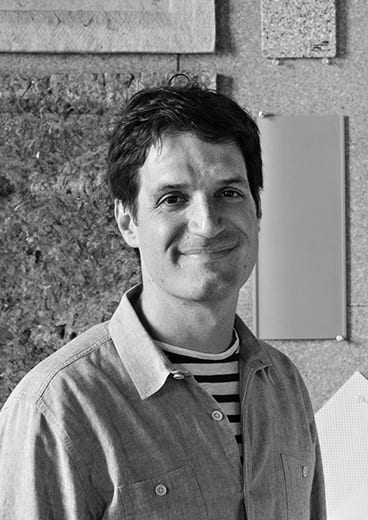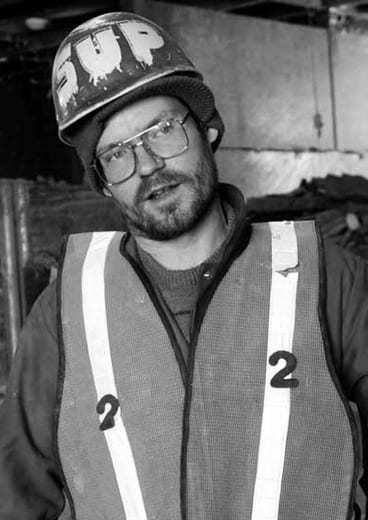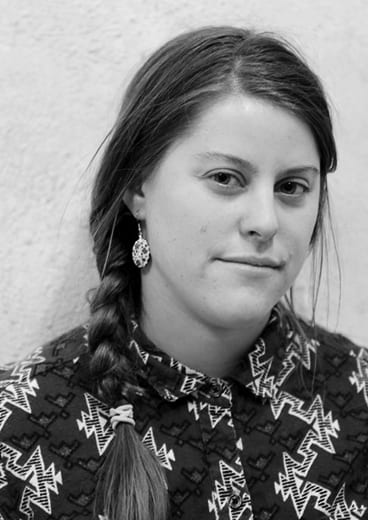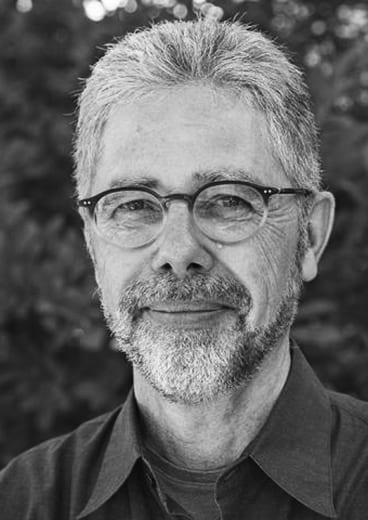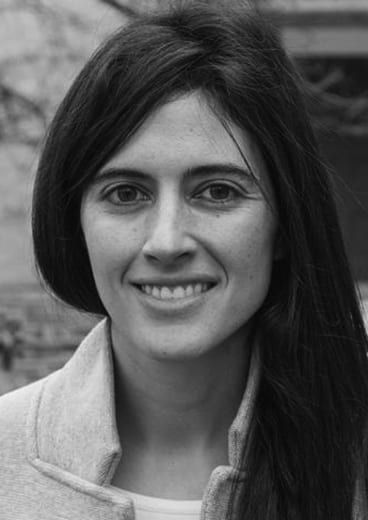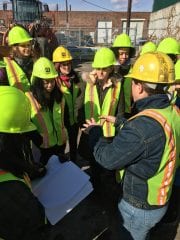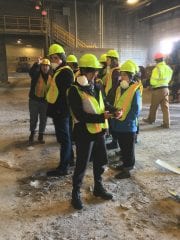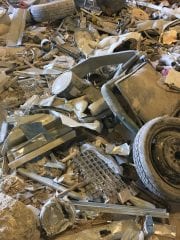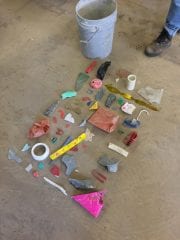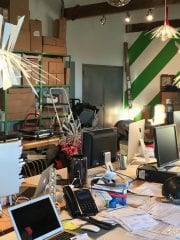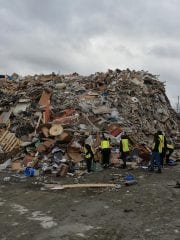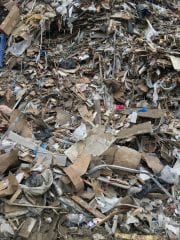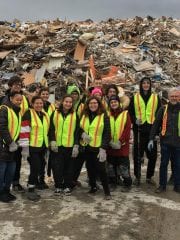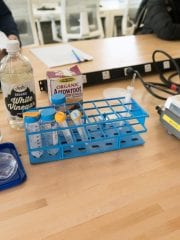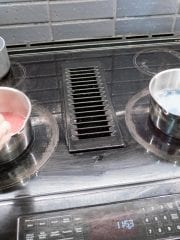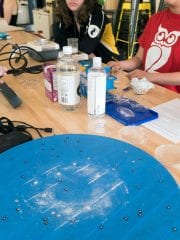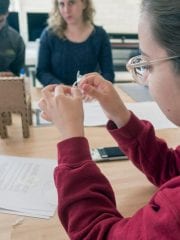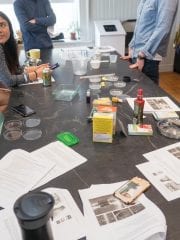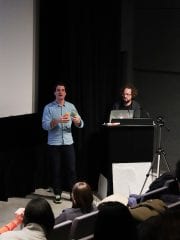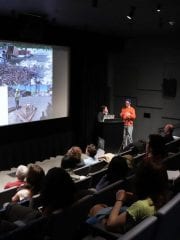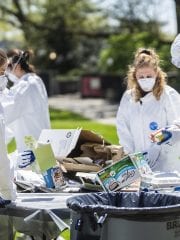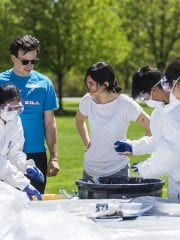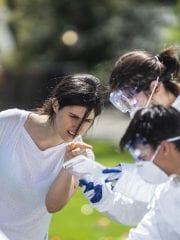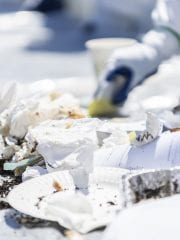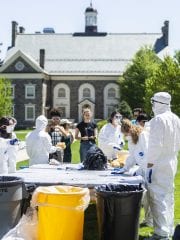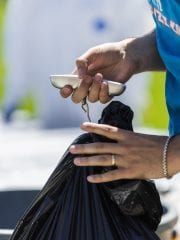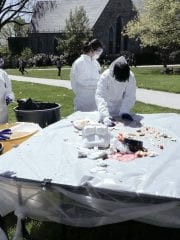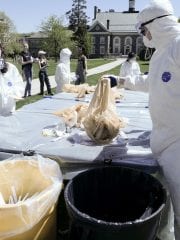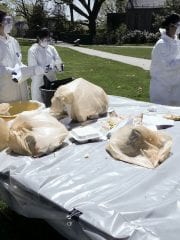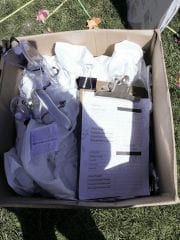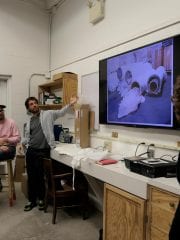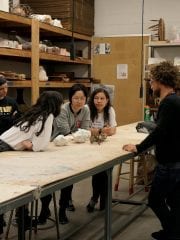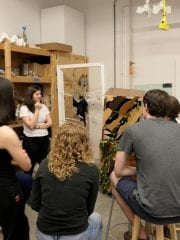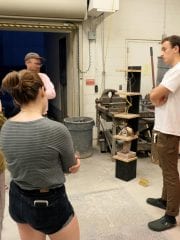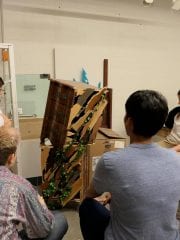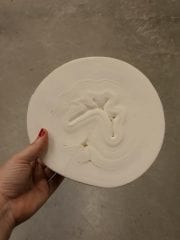PACC
Introduction
Infinite opportunities exist for consumer products to be fabricated from bio-based, renewable, or repurposed materials. Yet still, we live in a throw-away society. ‘Waste Culture: Rethinking Materials from Nature and Industry’ will engage students with local Philadelphia innovators, who are demonstrating eco-efficient practices that are driven by intentional material sourcing. In the lab, we will examine recently developed bio-based materials, with emphasis on fabrication processes, physical properties, and disruptions to traditional industries. In the studio, we will experiment with incorporating some of these bio-based materials as a new media. Together we ask, how can we contribute to generating sustainable consumer habits and industries?
This project was active during Spring 2019. The planning for this project began a semester in advance, and follow-up extended past the active period.
Collaborators
Events
RAIR: Billy Dufala, Director of Residencies and Co-Founder, and Lucia Thomé, Director of Special Projects
Non-Profit Partners
7333 Milnor St. Philadelphia, PA
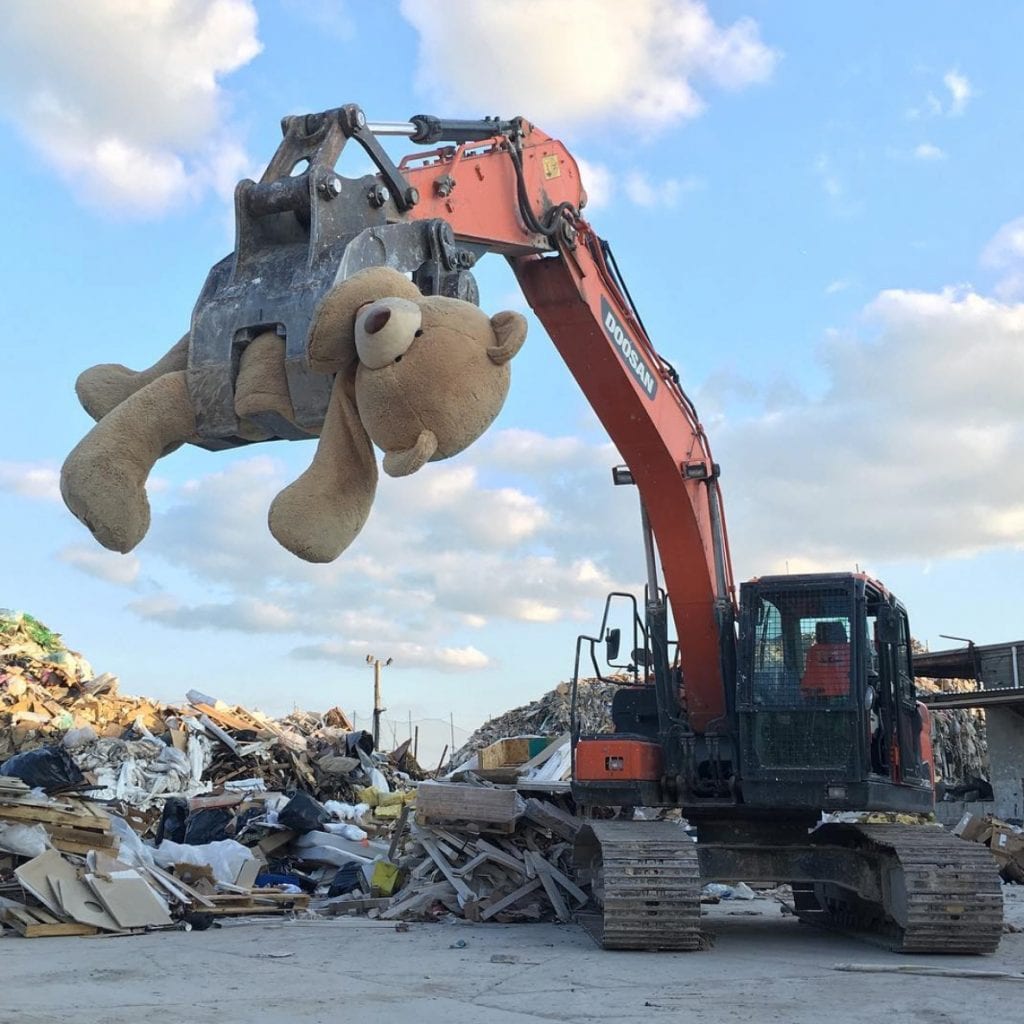
The mission of RAIR (Recycled Artist in Residency) is to challenge the perception of waste culture by providing a unique platform for artists at the intersection of art and industry. Situated inside a construction and demolition waste recycling company in northeast Philadelphia, RAIR offers artists studio space and access to more than 450 tons of materials per day.
Since its inception in 2010, RAIR’s flagship Residency Program has established itself as a unique opportunity for emerging, mid-career, and established artists. By facilitating artists’ direct engagement with the waste stream, RAIR encourages residents to consider their studio practice through the lens of sustainability and to thoughtfully re-assess their processes of material sourcing and waste disposal.
Collaborating with community groups, art institutions, and waste industry partners, RAIR has also extended its reach far beyond its resident artists through Projects including recycling facility tours, class presentations, public events, and exhibitions that illuminate the connections between art, industry, and sustainability. RAIR offers assistance with the material sourcing, planning, design, and fabrication involved in a range of cross-disciplinary projects, and works with collaborators to maximize the creative potential of waste materials.
Photo Credit: RAIR
Isaac Salm & Jaime Salm from MIO, Lead Artists
Artists in Residence
Philadelphia, PA
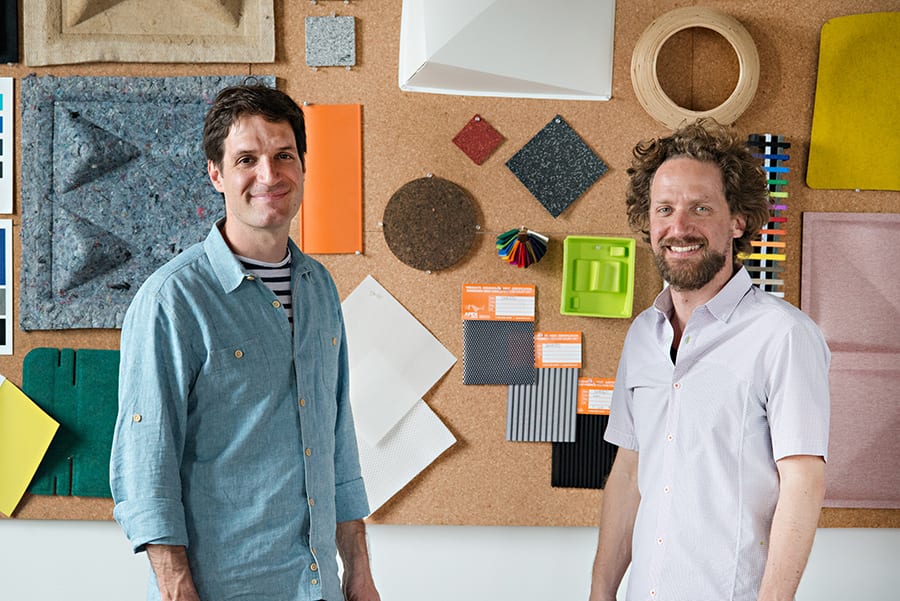
MIO was founded by the Salm brothers (Isaac, the numbers guy and Jaime, the design guy) with the objective of merging business rigor with environmentally and socially progressive design. Our mission is to give people the power to design living spaces with beautiful, sustainable, and highly personal product experiences.
To achieve this goal we design products, services, interactions, interiors and sustainable experiences. At MIO, we believe that sustainability is a value everyone should seek in all aspects of life. Our vision is to empower everyone to design and enjoy practical, beautiful, and sustainable living spaces. Giving shape to this new culture requires a paradigm shift. Changing minds drives us to create a design where responsibility and desire co-exist. Following this path, MIO is forging a new design language where beauty and sustainability are one – a process that leads to an inclusive and affordable design. We believe that consumers must be empowered to make a difference and that industry is a force for good.
Photo Credit: MIO
Recycled Artist In Residency (RAIR) Tour w/ Laboratory in Environmental Sciences Course
Site Visit
1.30
12:30-2:30pm, RAIR, 7333 Milnor St, Philadelphia, PA
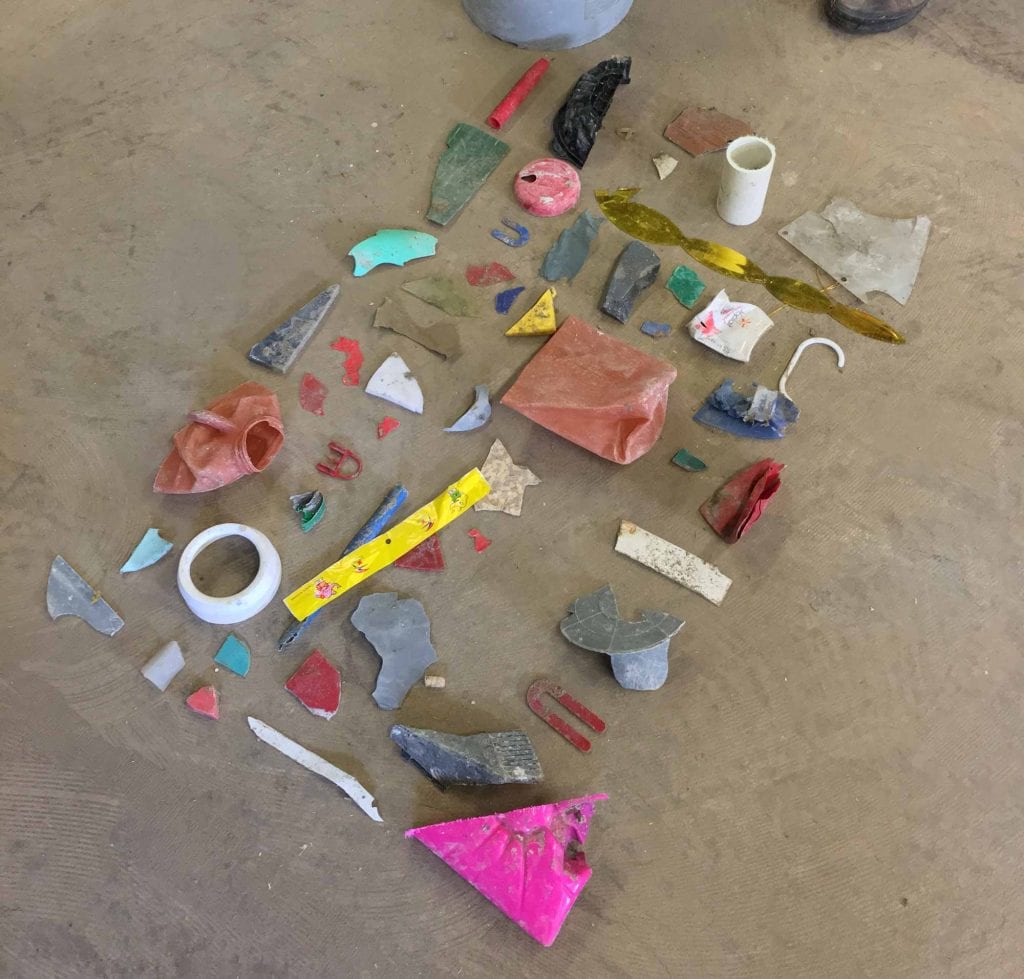
The students from professor Elisabeth Evans’ “Laboratory in Environmental Sciences” traveled by bus to RAIR and received a tour of the site from Lucia Thomé, Director of Special Projects at RAIR. Thomé walked the group through the administrative building, the sorting facility, and the area where the trucks dump materials to be sorted and recycled.
Thomé walked the students through the entire recycling process, pulling out examples of the most common types of materials that show up at RAIR (construction materials) before leading them up to RAIR’s on-site artist residency studio. The studio is one large room that is divided into separate areas for multiple artists to store their tools and objects they pick from the trash pile. We ended the tour with lunch and conversation in the office RAIR shares with Revolution Recovery.
Photo Credit: Stephanie Bursese
Recycled Artist In Residency (RAIR) Tour w/ Sculpture: Materials and Techniques Course
Site Visit
3.2
2-4pm, RAIR, 7333 Milnor St, Philadelphia, PA
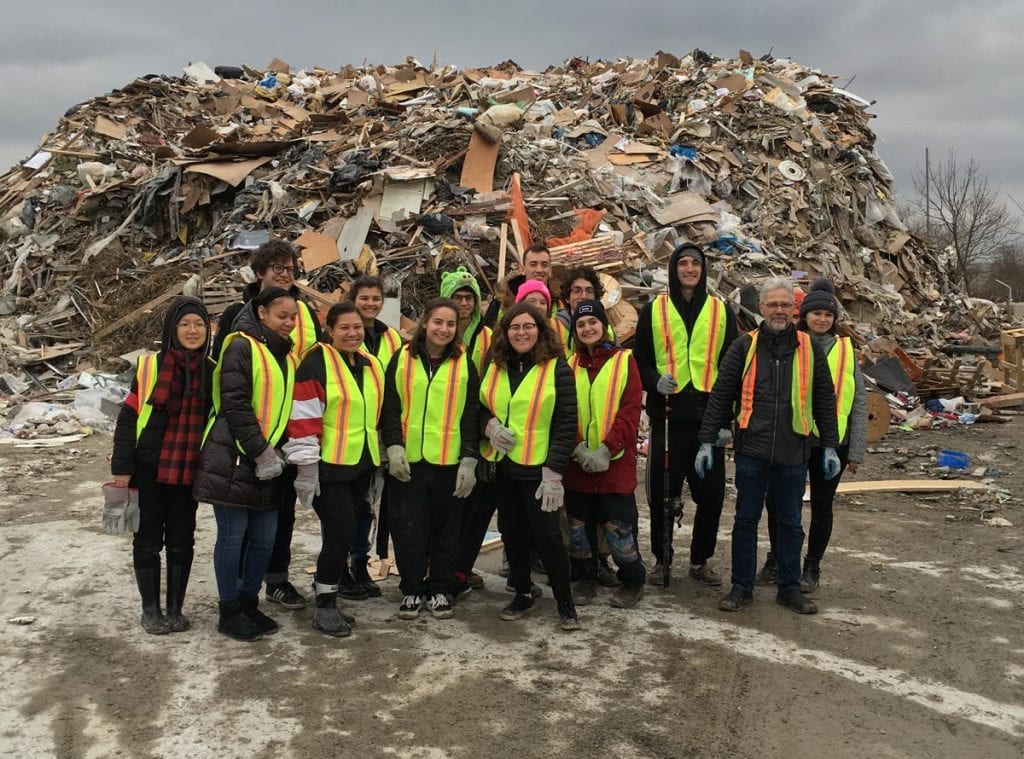
The students from Markus Baenziger’s “Sculpture: Materials and Techniques” traveled by bus to RAIR and received a tour of the site from Lucia Thomé, Director of Special Projects at RAIR, and Billy Dufala, Director of Residencies and Co-Founder. Thomé and Dufala walked the group through the administrative building, the sorting facility, and the area where the trucks dump materials to be sorted and recycled.
Thomé walked the students through the entire recycling process, pulling out examples of the most common types of materials that show up at RAIR (construction materials) before leading them up to RAIR’s on-site artist residency studio. The studio is one large room that is divided into separate areas for multiple artists to store their tools and objects they pick from the trash pile.
In addition to the tour, the sculpture students spent a significant amount of time picking through the trash pile themselves, gathering materials that were then loaded onto a pallet. Thomé transported those materials from the RAIR site back to Haverford, where the students used them to create artwork that was exhibited later in the semester.
Photo Credit: Stephanie Bursese
Rethinking Materials with RAIR, Non-Profit Partners & MIO, Lead Artists
Presentation
3.20
4:30-6pm, VCAM, Haverford College
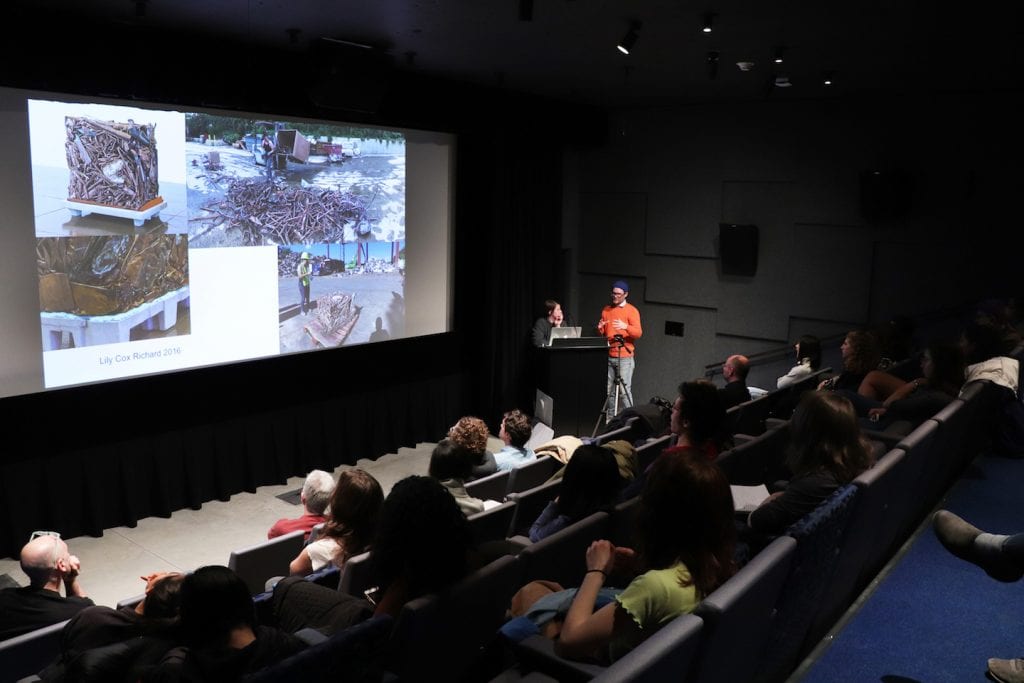
Part artist talk, part FAQ on starting your own organization: Isaac & Jaime Salm, Co-Founders of MIO design studio together with Billy Dufala & Lucia Thomé from Recycled Artist in Residency (RAIR), will sift through issues of industry, creative process and transformational trash.
This event is free and open to the public.
Photo Credit: Stephanie Bursese
Storytelling Workshop w/ Museum Hack and Laboratory in Environmental Sciences Course
Presentation & Workshop
3.27
11:30-12:30pm, VCAM, Haverford College
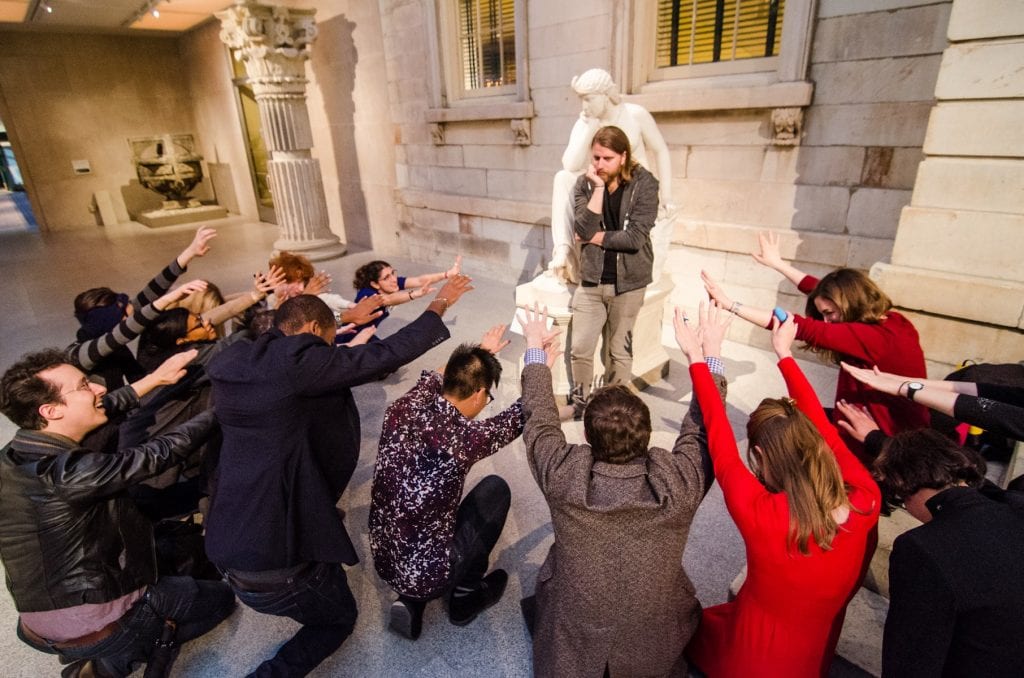
Museum Hack will be visiting Haverford to put on a storytelling workshop for the students in ENVS201 Laboratory in Environmental Sciences and ARTSH243 Materials & Techniques, two classes that are part of a collaborative PACC project this semester. The intent of the workshop is to inspire students to reflect upon in-classroom behavior, and more broadly approaches to learning, realizing that our level of engagement is integral to the learning process. More specifically, by participating in this workshop, we will:
1. Gain a toolset towards storytelling and instilled confidence in accessing our own ability to communicate and distill complex information to diverse audiences.
2. Shift our learning approach away from task completion towards narrative learning.
About Museum Hack:
Museum Hack exists to reimagine and inspire new adult museum experiences around the world. If you are a museum hater or even museum apathetic then prepare for mind = blown, because we are going to show you these institutions are not just pretty damn cool but are also the social and cultural amplifier on your brief-yet-meaningful-existence. In recent decades, museums are the under-dogs, and like Hamilton, the Mighty Ducks and NYC rent, they are going to rise up. We see a future where museums are the fulcrum of strong communities, and we’re singing them praises every single day. Come rap with us.
Photo Credit: Museum Hack
Bioplastics Workshop w/ Laboratory in Environmental Sciences & Sculpture: Materials and Techniques Courses
Workshop
4.17
11:15-12:45pm, VCAM, Haverford College
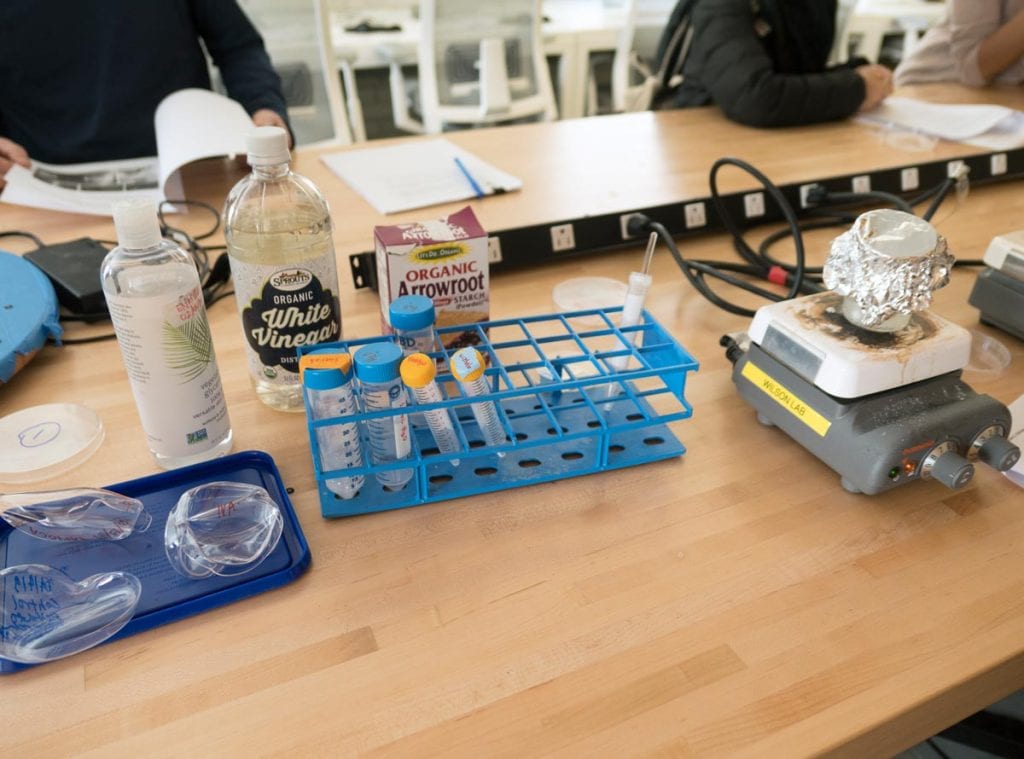
Through the bioplastics workshop and the subsequent final shareout event, activities were designed for the students to participate in the meaningful bidirectional transfer of knowledge. In the ENVS201 student-led bioplastic workshop, this was accomplished through multiple stations that the pairs of students (one from each course) cycled through. For example, the ENVS201 students in a format akin to a televised kitchen cooking show walked the ARTSH students through the process of fabricating a starch-based bioplastic. For a parallel counterpart, in the maker space, students starting with already made bioplastic films worked together to experiment with ways to transform a 2D film into a 3D form (a mini sculptural form). As a modality of experimentation with which the sculpture students are more versed in, the sculpture students took on the role of “teacher” in this workshop station.
Leading up to the bioplastics workshop, students participated in two storytelling workshops to empower them with confidence and some tools to communicate with each other across disciplines. The first event was put on by Museum Hack to both classes and the second was delivered by a guest lecture by Professor Nimisha Ladva to ENVS201. In the second workshop, Professor Ladva had ENVS201 students work on a personal mission statement in which they articulated why Environmental Studies were important to them. By working on this in advance, students could better engage one another in teaching moments across disciplines that occurred during the subsequent workshop and final shareout.
1. Background info brief presentation on bioplastics and specifically starch-based bioplastics: could be either slides in the screening room or with no visual cues anywhere
2. Mixing station in the VCAM kitchen were we mix/heat/prepare the pre-plastic mixture of all the ingredients (which are all food-grade/eco-friendly). We will pour and dehydrate these to become films (in the oven)
3. Creativity/experimentation station in the Maker space, where we could provide already cast starch bioplastic films for the students to play or experiment with.
Photo Credit: Stephanie Bursese
Read lessTrash Audit w/ Laboratory in Environmental Sciences Course
Workshop
4.24
11:15-12:45PM, Founders Green, Haverford College
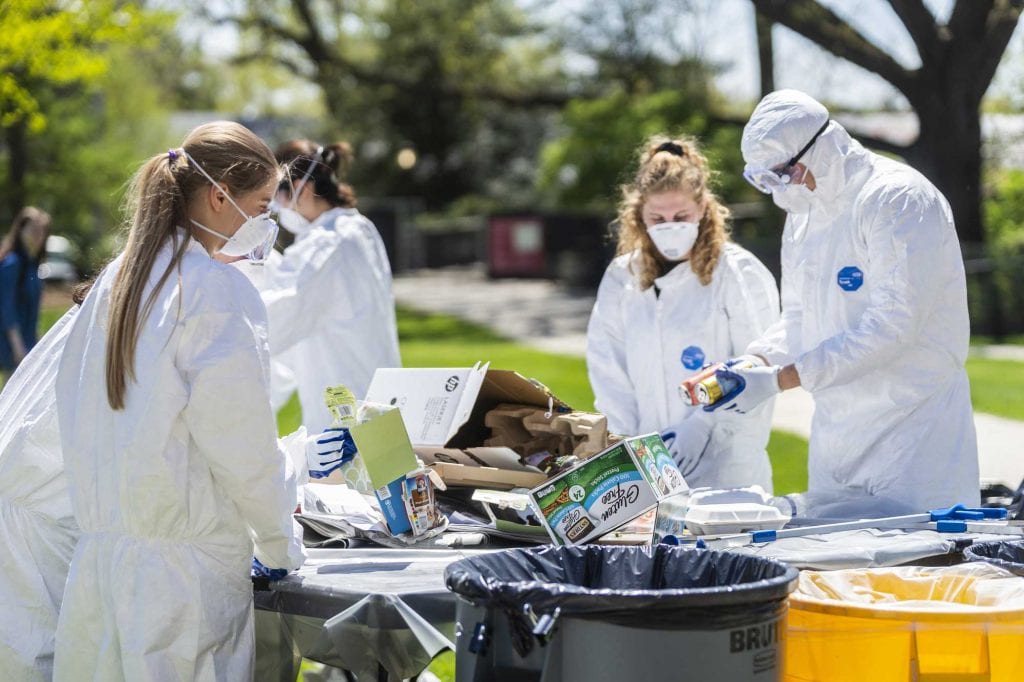
On Wednesday afternoon (hours prior to the shareout event), as part of Earth Week, Elisabeth Evans’ course “Laboratory in Environmental Sciences” assisted the college’s Office of the President for a waste assessment audit. The students sorted through Haverford College garbage in order to make some specific observations about how much waste could be diverted to recycling or compost streams (waste was collected from both a residential and administrative building as a representative sampling).
Photo Credit: Haverford College Communications
Waste Culture Share Out w/ MIO, RAIR, Sculpture & Environmental Studies Courses
Presentation, Critique and Discussion
4.24
7- 9pm, Sculpture Foundry, Haverford College
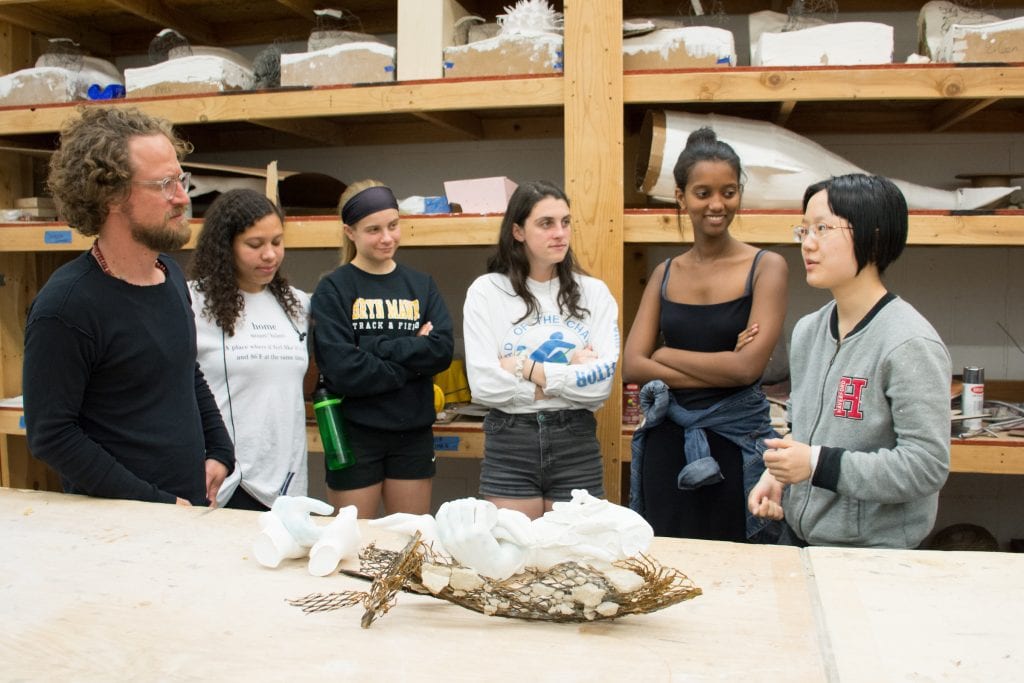
After enjoying a community dinner together in the Foundry, we broke out into critique groups comprised of students from both courses and at least one member of MIO or RAIR. The sculpture students shared their work in progress which was partially created with the materials they collected at RAIR. Environmental Studies students shared some of the findings from the bioplastics workshop they had participated in the week prior.
MIO & RAIR shared findings about usable materials from RAIR. MIO gave a presentation on their field trip to Fibermatic and outlined how their process of how they go about testing, scheduling test production runs, and the steps of imagining how a product might be utilized.
Photo Credit: Haverford College Communications
